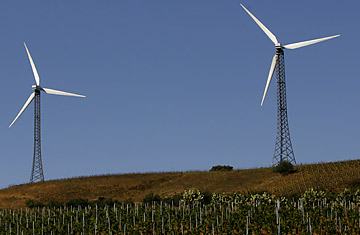
Wind turbines are pictured in the village of Patirnico, a village between Palermo and Trapani, on September 15, 2010.
Since the time of Phoenician sailors and Greek settlers, Sicily's Most coveted resources have been the sun and the wind. These days, drive nearly any stretch of the Mediterranean island and you'll likely come across wind farms, looming like giants from behind the mountains. In some parts of Sicily, solar-power plants alternate with farmers' fields; in some cases the two are even combined in photovoltaic-covered greenhouses. Italy is now the third-largest producer of wind power in Europe and its production of solar energy is booming, driven by generous government subsidies — with much of that growth in the sunny, windy south.
No surprise, then, that along with environmentally minded entrepreneurs, Sicily is attracting an organization that cares only about the other kind of green: the mafia. "The mafia goes where the money is" says Domenico Fontana, head of the Sicilian branch of Legambiante, the country's largest environmental group. [Renewable energy] is one of the richest sectors of the economy. It's obvious that the mafia wants to be there."
And the Sicilian mafia, the Cosa Nostra, seems to have already gained a foothold in the relatively young industry. Last September, Italian police confiscated their largest ever collection of mafia assets when they seized assets worth $1.9 billion from a Sicilian businessman named Vito Nicastri. The haul included 43 wind and solar companies and around 100 properties, including luxury villas in western Sicily. Nicastri, known as "The Lord of the Wind" because he was the island's largest developer of wind farms, had been arrested the year before and accused of ties to Matteo Messina Denaro, a man believed to be the head of the Sicilian mafia.
Unlike the mob's usual criminal activities — trafficking in arms or drugs, investments in real estate, waste management and construction — the renewable-energy sector requires technical prowess. Which is why the mafia seems to have mainly taken on the role of middle man: arranging contracts, buying up land, organizing government permissions, snatching up the construction contracts. The overheated demand caused by subsidies has brought in financial speculation — some 90% of the authorizations to build power plants are subsequently sold — making the market particularly permeable to organized crime. "They [in the mafia] know everybody," says Giosue' Marino, Sicily's councilor for energy and a former police prefect of Palermo, adding that the mob's involvement in the sector undermines legitimate competition. "The mafia doesn't need to go into a bank and apply for loans. They don't have problems with unions. So it's the healthy entrepreneur who suffers and finds himself left in the margins."
On top of that, prosecutors say the mafia uses investments in clean energy to launder its dirty money — funds gained from less reputable sources, such as arms and drug trafficking, which are then used to continue to challenge the government for control of the island. "The mafia and the state can't coexist," says Francesco Messineo, the public prosecutor in charge of Sicily's anti-mafia operations. "One is the negation of the other." The government, says Messineo, has managed to wrestle the mafia to the ground. The next step is to choke off its cash flow. "Controlling the energy sector is fundamental," he says. "Keeping the mafia outside would be an important success [for the government]."
The mafia's foray into green technology shows how much Sicily's Cosa Nostra has changed since the 1990s, when it waged a high-profile war on the state, assassinating judges and prompting the government to send in the military. The subsequent crackdown and outrage over the murders has pressed the Sicilian mob to the margins and made it far less dangerous that the organized crime gangs operating on the Italian mainland. Violence on the island has fallen. The last mafia murder in the economic capital Palermo took place four years ago. Not only have businesses started to refuse to pay protection money, industry organizations have made it a policy to throw out any member that collaborates with the mob.
But just because the mafia seems to be slowly fading into the island's history doesn't mean Sicily's problems are over. One legitimate investor in alternative energies, Moncada energy CEO Salvatore Moncada, twice denounced mob interference in his business — once in 2002, when he refused to be extorted and lived with a 24-hour police escort for 18 months, and once in 2009 when he alerted police to a mafia buy-up of the land around one of his wind-power plants. Moncada says his biggest worry today isn't the mob or the threat of violence. It's wringing out permission for the construction of his power plants from allegedly corrupt bureaucrats. "The mafia used to shoot," says Moncada. "Today it doesn't. So it's become a lot less of a threat than the white-collar criminals."
